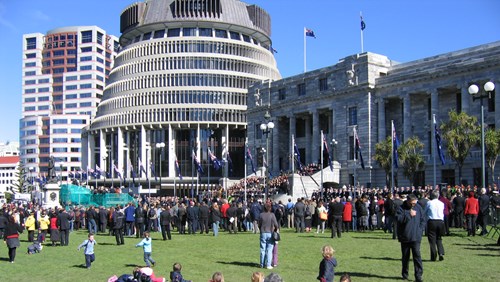
Assistant Minister McBride Addresses NSW PSA
I acknowledge the traditional custodians of the land on which we meet and pay my respects to elders past and present. I extend that respect to all First Nations people here today
Thank you for the invitation to be here today.
It’s good to be with you so soon after an election in which our movement achieved such a resounding result.
It was a campaign in which we laid out a clear set of Labor values and a vision of how we see a stronger and fairer nation:
And Australians overwhelming supported that vision.
They also said an emphatic ‘no’ to cheap attacks on public servants.
They said ‘no’ to wholesale sackings.
To demonisations.
They voted in support of quality public services and the people who provide them, and I hope that has given reassurance not only to federal public servants but to state public servants too.
I want to extend my personal thanks to Stewart and all at the PSA for your support of me and my campaign on the Central Coast.
We achieved a result in Dobell which I would hardly have believed to be possible when I first ran in 2013.
I also want to thank each and every one of you who supported Labor candidates in electorates around the state.
Campaigning in un-held regional seats is tough.
But Labor has a strong story to tell in those communities and we can only ever hope to tell it through the voices of people who work and live in them.
This election result gives me a great sense optimism for what we can achieve, particularly in the health portfolio.
We began a bold agenda in our first term and delivering it in full was always going to need more time.
The win gives us the opportunity to keep working with New South Wales and other state and territory governments on health challenges which can only be addressed by working together.
We have previously held dialogues for Commonwealth-state cooperation on the particular challenges of rural health in NSW and I look forward to resuming those, having been reappointed to my position as Assistant Minister for Rural and Regional Health.
These discussions will go to our many shared responsibilities, for example in hospital and aged care, and in mental health.
Underpinning these shared responsibilities, the Australian Government will provide investments and policy reform in primary care on a scale which the country has not seen before.
A stronger Medicare means we can move away from tired debates about city verses country and a fight for scarce resources, to a discussion about lifting bulk-billing everywhere, training doctors everywhere, and health professionals working to the top of their skills and training.
Bulk-billing is Medicare’s beating heart.
The benefits of our historic increase in bulk-billing incentives have been felt most in rural and regional Australia. The more regional, rural and remote, the greater the rebate and the greater the improvement we have seen in the past 18 months.
Australians in regional, rural and remote areas have had an estimated
2.8 million additional bulk-billing incentive claims since the tripled incentive began on 1 November 2023.
Making bulk-billing incentives available for all Australians from 1 November this year will also be of great benefit for regional, rural and remote areas – good for their health and good for their hip pockets.
General practices will also be able to participate in the Bulk Billing Practice Incentive Program, which will provide an additional 12.5 per cent payment to GPs and practices that bulk bill all the patients that come through their doors.
It will mean, 9 out of 10 GP visits to be bulk billed by 2030.
We are backing this in with investments to grow the primary healthcare workforce, through training – including the largest GP training program ever – and retaining more doctors, nurses and midwives.
In the 2025-26 Budget, the Australian Government invested an extra $662.6 million in the health workforce to support Australians to access care whenever and wherever they need it:
This is expected to deliver around 2,900 additional GPs and trainees by 2033.
It will also support a major expansion to the Medicare Urgent Care Clinic network – our commitment to a further 50 over the 2025-26 financial year which will bring the national total to 137 clinics.
Of this total, some 48 clinics will be operating in regional, rural and remote communities and they will mean four in five Australians are within 20 minutes’ drive of an urgent care clinic.
I also want to make the connection to innovation and scope of practice for better rural and regional health outcomes.
We will pick up on the recommendations of a major scope of practice review completed last year.
Nurses, midwives, allied health and mental health professionals working to their full scope will be of great benefit beyond the cities, where access and availability to care can be limited.
We will also capture the learnings from a number of Innovative Models of Care grants, which have shown what leaders rural health professionals can be in working to the top of scope and creating multidisciplinary health teams where the whole is greater than the sum of the parts.
Taking some of these examples and turning them into broader policy is one of the challenges we have set ourselves.
We rely heavily on skilled professionals such as you and, again, I hope that in the governments you see in both Sydney and Canberra that you see leaders keen to see this type of innovation and policy.
Lastly, in mental health.
Some of you might have seen the announcement I made with the Prime Minister in Ashfield during the campaign – $1 billion for mental health.
We showed in our first term that we could provide more mental health services free under Medicare, and we are doubling down on that approach in our second.
The Government will deliver vital mental health services and expand the range and reach of free mental health supports to better cater to all Australians and make sure that everyone can access the care they need.
As we roll out these additional services, we will consult with state and territory governments to make sure our services are integrated and meet the needs of local communities.
This builds on the implementation of the National Mental Health and Suicide Prevention Agreement and its bilateral agreements.
Currently, 38 Medicare Mental Health Centres are open across Australia, including 14 in NSW in towns such as Lismore, Coffs Harbour, Muswellbrook, Moruya, Young, Wagga Wagga and Bathurst.
Medicare Mental Health Centres provide a welcoming and safe place where everyone can access free and confidential mental health information, services and supports from trained mental health professionals and people with lived experience of mental ill health.
No referral or appointment is needed to access services.
In this term, we will be rolling out 31 new and upgraded Medicare Mental Health Centres so more Australians can access free mental health care.
This $225 million investment includes eight new centres in NSW – in Cessnock, Nowra, Queanbeyan, as well as metropolitan locations.
The headspace network will receive substantial new funding.
A $90 million investment will mean that the mental health workforce continues to grow and support the government’s substantial investment in the mental health system.
And we will come together with state governments to respond to the unmet needs which remain for too many Australians with significant psychosocial support needs.
I cannot overstate how important the sense of goodwill we have built with state governments is to this work.
And our best chance at meeting our shared challenges is by working together at all levels – both ministers and officials.
Your union plays an important role in this discussion too.
Many of us in Labor like to describe Medicare as Australia’s greatest social program.
A Labor creation for generations.
And one in which unions were there at the table, supporting Labor governments and, through their members, telling the story in the community about why such reform was important.
As we work to strengthen Medicare, our movement can once again do it together.
It’s such an exciting opportunity.
I thank you all for your contributions and wish you the best for this conference.
Thank you.
https://www.health.gov.au/sites/default/files/2025-03/budget-2025-26-strengthening-medicare-health-workforce.pdf#_blank


